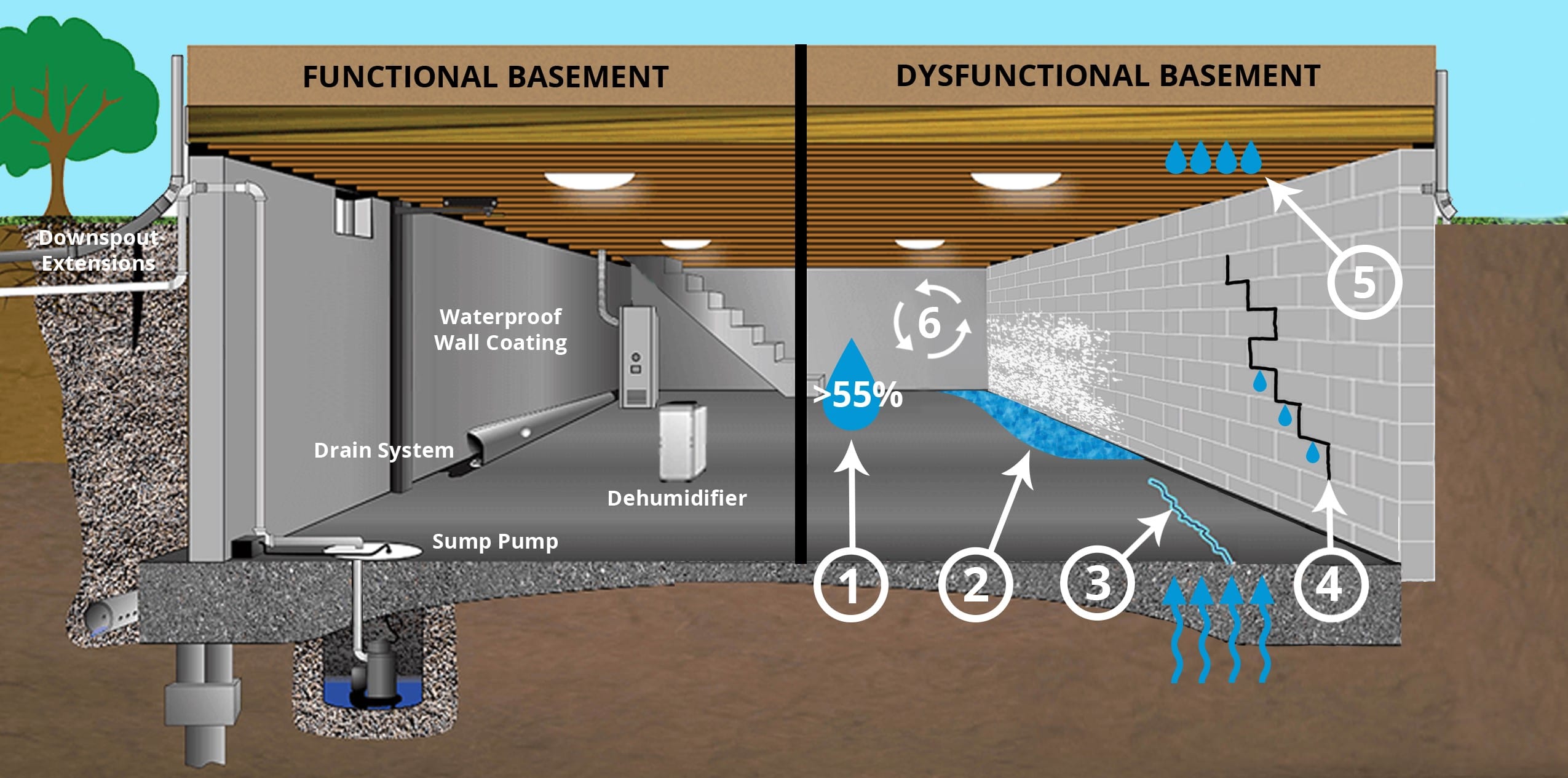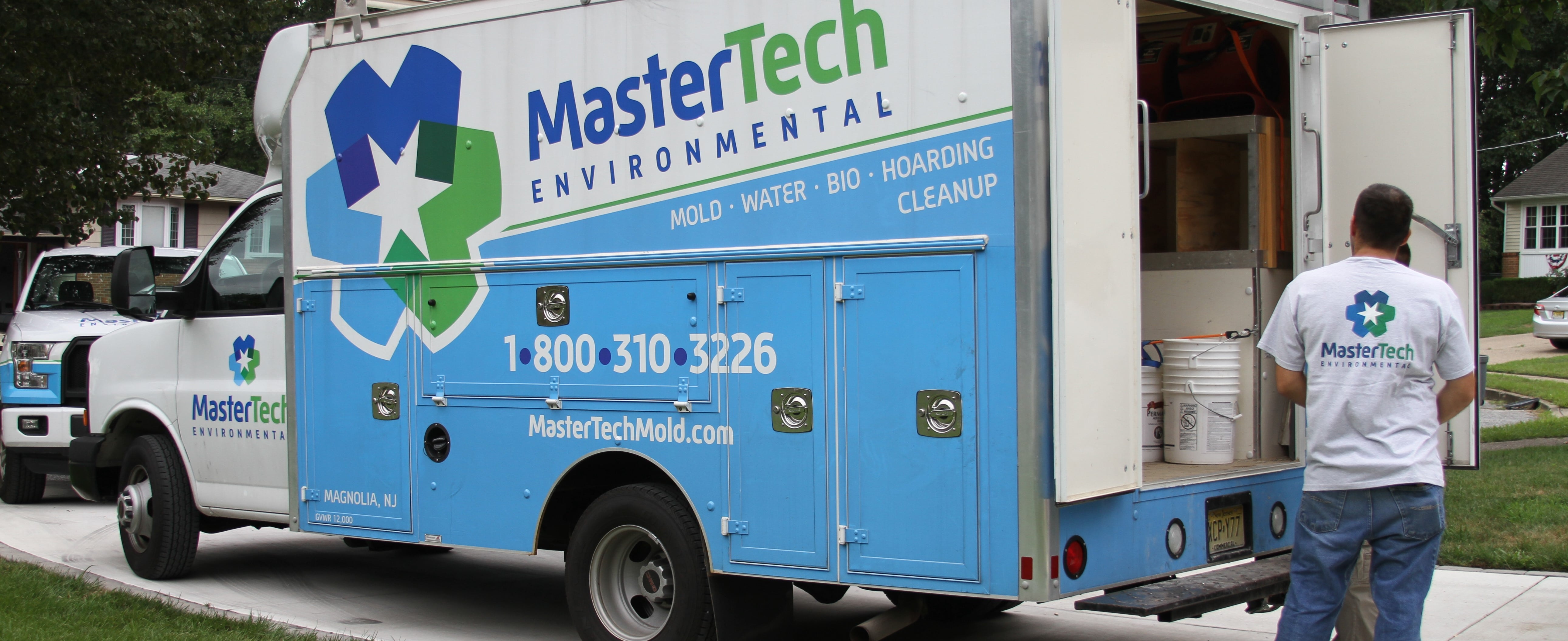
What Is Causing Mold In The Basement of My South Jersey Home?
Mold growth in basements in a common problem in buildings throughout the Southern New Jersey. It is pretty common knowledge that mold is most often the result of a moisture problem like an active water leak or flooding. But, it is important for South Jersey homeowners to know that you don’t need a major water even like flooding or a frozen pipe leak to end up with mold. Mold can also be caused by seemingly minor issues like high humidity, condensation or poor ventilation. Most reports of mold is often accompanied by a report of some general dampness in the cellar. So what exactly is making your basement damp and causing moldy floors joists, ceilings and walls?
The Most Common Causes of Mold & Moisture Problems in South Jersey Basements
If you suspect a mold problem or recently uncovered mold growth in your cellar, you might be asking yourself, “What is causing mold in my basement?” Well, the short answer is likely moisture. But, what exactly is making your basement wet enough to end up with mold growth? It is likely a combination of issues. Let us take a closer look at the most common basement issues that end up causing moisture and mold.
- High Humidity Above 50% – Relative humidity levels above 50% is considered elevated and problematic. Given the New Jersey’s climate, high humidity is one of the leading sources of mold problems in basements and crawl spaces of residential and commercial properties.
- Basement Flooding – Moisture problems like flooding can cause mold to develop or exacerbate an already existing mold problem. If flood waters are not extracted or diverted out and away from the basement in a timely manner, humidity will increase as the water evaporates and the mold will spread.
- Water Vapors – Groundwater vapors creep up through the slab floor’s cracks and crevices. As the damp vapors rise, they cling to and soak into the wood framing members above, resulting in moldy basement ceilings, as well as mold growth on floors and subflooring. Water vapors emitted into the basement through the slab also causes spikes in humidity levels.
- Water Seepage at Foundation Walls – Leaky foundation walls is a common moisture source for mold. The first sign of potential water infiltration is the presence of efflorescence on foundation walls. Efflorescence is a white, chalky buildup that occurs on foundation walls when water seeps through to the interior carrying minerals and salts. When the water evaporates, it leaves behind the mineral and salt deposits which is what you see on your masonry walls. Foundation wall seepage will contribute to humidity issues as the water evaporates.
- Condensation – A humid basement is more vulnerable to additional moisture issues like condensation. When cool surfaces of ductwork, piping and HVAC components come into contact with humid air, the water vapors cool rapidly, fall out of suspension and leave behind water (or condensation) at the surface. Ductwork condensation in the basement is a sign of a humidity issue. Both humidity and condensation can cause widespread mold growth.
- Poor Air Circulation – South Jersey homeowners often use basements for storage which can interrupt air circulation. Excessive stored contents can limit air flow, allowing moisture from the stagnant, damp air to build up and eventually develop mold.
How Can South Jersey Homeowners Prevent Basement Mold in Their Properties
Mold prevention begins by getting the moisture issues under control. A clean, safe & mold-free basement is one that is dry. Mold cleanup should be the first step if you already have a mold problem. To prevent moisture buildup and probable regrowth after mold cleanup, the following moisture control strategies should be taken into consideration and implemented as needed.
- Dehumidification – To prevent mold, indoor humidity levels should be kept under 50%. One of the most effective ways to maintain humidity below 50% is via a properly rated basement dehumidifier with drainage to the exterior.
- Drainage – Have a local waterproofing specialist inspect your basement to see if you have sufficient drainage to properly channel water away from your structure. Drainage problems should be addressed and corrected as necessary.
- Masonry Repairs – Assess for signs of damage to your foundation walls and slab. Perforations in the wall should be thoroughly sealed. All cracks must be filled. It’s possible that you’ll need to hire a local foundation repair professional perform the repairs.
- Air Flow – South Jersey homeowners can optimize air flow and circulation by decluttering. Reducing the amount of goods stored in the cellar is a simple and low-cost technique to improve air circulation and prevent the accumulation of moist, stagnant air.
In situations with an existing mold issue, the basement mold remediation should be the priority. Repairs, waterproofing and/or reconstructions should be performed after of the removal of the mold. Otherwise, contactors can end up causing cross-contamination to other areas and expedite the spread of mold. Mold remediation is always completed under containment to minimize the risk of spread mold to clean and unaffected areas. Once the mold has been cleaned up, contractors can work freely without the worry of cross-contamination and risk of exposure to mold.

Local Basement Mold Remediation Services in New Jersey
If you think you have mold in your basement, you should have it checked out by a certified mold inspector near you. Whether you have mold on your basement ceiling as a result of a leak or moldy floor joists as a result of high humidity, professional remediation is likely necessary. Mastertech Environmental is a locally owned mold remediation company specializing in basement mold removal in South Jersey. To learn more about our local services, call our office today — 609-948-8844.


